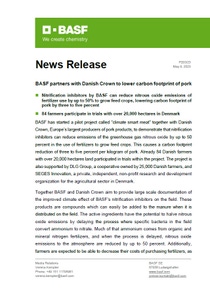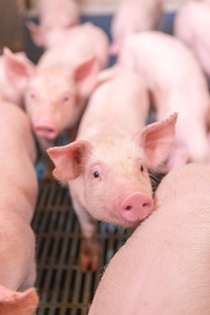Agriculture
BASF partners with Danish Crown to lower carbon footprint of pork
- Nitrification inhibitors by BASF can reduce nitrous oxide emissions of fertilizer use by up to 50% to grow feed crops, lowering carbon footprint of pork by three to five percent
- 84 farmers participate in trials with over 20,000 hectares in Denmark
BASF has started a pilot project called “climate smart meat” together with Danish Crown, Europe’s largest producers of pork products, to demonstrate that nitrification inhibitors can reduce emissions of the greenhouse gas nitrous oxide by up to 50 percent in the use of fertilizers to grow feed crops. This causes a carbon footprint reduction of three to five percent per kilogram of pork. Already 84 Danish farmers with over 20,000 hectares land participated in trials within the project. The project is also supported by DLG Group, a cooperative owned by 25,000 Danish farmers, and SEGES Innovation, a private, independent, non-profit research and development organization for the agricultural sector in Denmark.
Together BASF and Danish Crown aim to provide large scale documentation of the improved climate effect of BASF’s nitrification inhibitors on the field. These products are compounds which can easily be added to the manure when it is distributed on the field. The active ingredients have the potential to halve nitrous oxide emissions by delaying the process where specific bacteria in the field convert ammonium to nitrate. Much of that ammonium comes from organic and mineral nitrogen fertilizers, and when the process is delayed, nitrous oxide emissions to the atmosphere are reduced by up to 50 percent. Additionally, farmers are expected to be able to decrease their costs of purchasing fertilizers, as they are more efficiently absorbed.
“Our nitrification inhibitors are widely known and used to limit the leaching of nitrate from the fields and increase the utilization rate of the nutrients in the slurry. But what is so interesting for pork farmers now, is the impact this can have on the carbon footprint of pork meat. Denmark is a small country, but one of the largest pork producers in Europe – imagine if we scale it up, how much greenhouse gas emissions could be saved in pork meat production in Europe and even beyond”, says Anders Fjendbo, Agsolution Manager at BASF in Denmark.
“We have the ambitious goal to halve greenhouse gas emissions from pork production by 2030 and reach net zero by 2050, and we are working hard on this every single day in every direction”, says Nicolaj Nørgaard, Senior Vice President Farming from Danish Crown. “This ambitious project with BASF can make a real difference in reducing the amount of greenhouse gases from manure and at the same time ensuring better utilization of nitrogen, which is crucial in times of high fertilizer prices”.
The farmers are now preparing their fields for the upcoming season. BASF expects the final field data to be available in fall 2023 when the fields are harvested. Concrete data for each kilogram of pork meat is expected in spring 2024.
To learn more about this project, visit the BASF booth at the Agri-Food & Climate Circle on May 10-11 in Copenhagen: www.agrifoodcircle.com.
About BASF’s Agricultural Solutions Division
Farming is fundamental to provide enough healthy and affordable food for a rapidly growing population while reducing environmental impacts. Working with partners and agricultural experts and by integrating sustainability criteria into all business decisions, we help farmers to create a positive impact on sustainable agriculture. That’s why we invest in a strong R&D pipeline, connecting innovative thinking with practical action in the field. Our portfolio comprises seeds and specifically selected plant traits, chemical and biological crop protection, solutions for soil management, plant health, pest control and digital farming. With expert teams in the lab, field, office and in production, we strive to find the right balance for success – for farmers, agriculture and future generations. In 2022, our division generated sales of €10.3 billion. For more information, please visit www.agriculture.basf.com or any of our social media channels.
About BASF
At BASF, we create chemistry for a sustainable future. We combine economic success with environmental protection and social responsibility. More than 111,000 employees in the BASF Group contribute to the success of our customers in nearly all sectors and almost every country in the world. Our portfolio comprises six segments: Chemicals, Materials, Industrial Solutions, Surface Technologies, Nutrition & Care and Agricultural Solutions. BASF generated sales of €87.3 billion in 2022. BASF shares are traded on the stock exchange in Frankfurt (BAS) and as American Depositary Receipts (BASFY) in the United States. Further information at www.basf.com.

